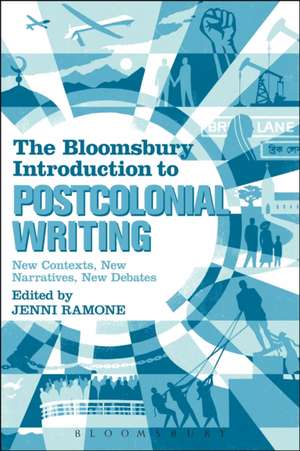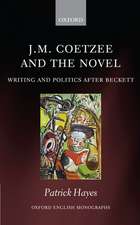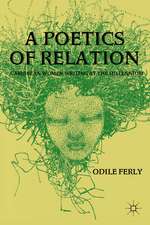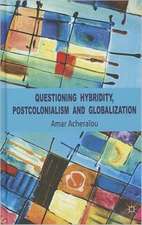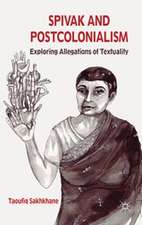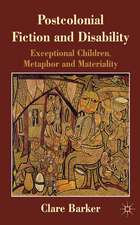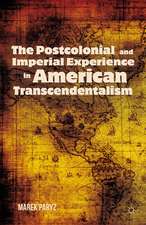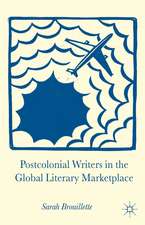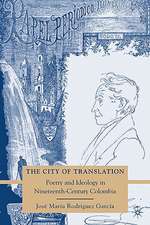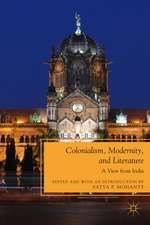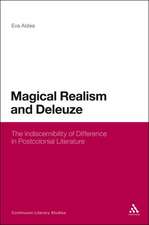The Bloomsbury Introduction to Postcolonial Writing: New Contexts, New Narratives, New Debates
Editat de Dr Jenni Ramoneen Limba Engleză Paperback – 15 noi 2017
| Toate formatele și edițiile | Preț | Express |
|---|---|---|
| Paperback (1) | 183.54 lei 3-5 săpt. | |
| Bloomsbury Publishing – 15 noi 2017 | 183.54 lei 3-5 săpt. | |
| Hardback (1) | 543.25 lei 6-8 săpt. | |
| Bloomsbury Publishing – 15 noi 2017 | 543.25 lei 6-8 săpt. |
Preț: 183.54 lei
Preț vechi: 222.35 lei
-17% Nou
Puncte Express: 275
Preț estimativ în valută:
35.12€ • 36.77$ • 29.06£
35.12€ • 36.77$ • 29.06£
Carte disponibilă
Livrare economică 15-29 martie
Preluare comenzi: 021 569.72.76
Specificații
ISBN-13: 9781474240079
ISBN-10: 1474240070
Pagini: 376
Dimensiuni: 156 x 234 x 24 mm
Greutate: 0.59 kg
Editura: Bloomsbury Publishing
Colecția Bloomsbury Academic
Locul publicării:London, United Kingdom
ISBN-10: 1474240070
Pagini: 376
Dimensiuni: 156 x 234 x 24 mm
Greutate: 0.59 kg
Editura: Bloomsbury Publishing
Colecția Bloomsbury Academic
Locul publicării:London, United Kingdom
Caracteristici
Covers a wider range of media than any other introduction - including literature, film, graphic novels and video games
Notă biografică
Jenni Ramone is Senior Lecturer in Postcolonial Studies at Nottingham Trent University, UK. She is the author of Postcolonial Theories (2011) and specialises in literature and the literary marketplace in Cuba, Nigeria, South Asia, and Black British writing.
Cuprins
1. Introduction: Postcolonial Literary Studies Now Jenni Ramone NEW CONTEXTS2. The Global and the Neoliberal: Indra Sinha's Animal's People, from Human Community to Zones of Indistinction Philip Leonard3. Disaster, Governance and (Post-)colonial literatures Upamanyu Pablo Mukherjee4. The Postcolonial Book Market: Reading and the local literary marketplace Jenni Ramone5. Postcolonial Economics: Literary Critiques of Inequality Melissa Kennedy6. Postcolonial Studies in the Digital Age: An Introduction Roopika Risam 7. 'Another World is Possible': Radicalizing World Literature via the Postcolonial Wendy Knepper NEW NARRATIVES8. Postcolonial Poetry Emma Bird9. Postcolonial Noncitizenship in Australian Theatre and Performance: Twenty-First Century Paradigms Emma Cox10. Graphic History: Postcolonial Texts and Contexts Binita Mehta and Pia Mukherji 11. Postcolonial Life-writing Jocelyn Fenton Stitt12. Decolonization and Postcolonial Cinema in Canada, Brazil, Australia and Nigeria Kerstin Knopf NEW DEBATES13. Postcolonial Refugees, Displacement, Dispossession and Economies of Abandonment in the Capitalist World System Stephen Morton14. Postcolonial Sexualities and the Intelligibility of Dissidence Humaira Saeed15. Contemporary Migration and Diaspora Studies: Current Debates and the Role of Literature Subha Xavier16. Postcolonial Studies and African American Literature John Cullen Gruesser17. Faith, Secularism and Community in Womanist Literature from the Neocolonial Caribbean Dawn Miranda Sherratt-Bado18. Secularism in India: Principles and Policies Manav Ratti BibliographyIndex
Recenzii
Jenni Ramone's collected volume is timely and brings together essays that redress the most recent accusationsleveled against the field. An excellent and stimulating resource for students, as well as for new and seasoned scholars in the humanities and social sciences.
In her valuable study of local literary marketplaces in former colonies, Jenni Ramone considers the ways in which local texts present reading ... Features excellent essays on gendered communal violence in India.
A valuable and innovative intervention in the field of contemporary postcolonial literary studies ... Through its engagement with a range of pressing postcolonial issues, this advanced introduction, which includes a useful glossary of key critical terms, evidences the ongoing relevance, in today's world, of the postcolonial and its "narratives of resistance" (7) to (neo)colonialism; it will, accordingly, give food for thought to researchers and students, as well as to anyone interested in postcolonial studies and their multifarious subfields of scholarship.
Those wishing to familiarise themselves with the new research emerging within postcolonial studies would do well to begin here. This volume showcases the exciting and innovative work being pursued by younger and more established scholars who are extending and reshaping the provenance of the 'postcolonial' in response to the new challenges and developments that have profoundly transformed the geo-political frames of enquiry since the field was first established. Tackling issues such as neoliberal globalisation, migration and refugee crises, uneven development, exclusionary and racialized state governmentalities, faith and secularism, eco-crisis, the formation of the global literary marketplace and the tension between postcolonial studies and world literature, as well as addressing hitherto relatively under-examined aspects of postcolonial literary and cultural studies, this volume is a welcome reminder that prognoses of the obsolescence of postcolonial studies have been greatly exaggerated: on this evidence, the field is in rude health.
This is an exciting and valuable new contribution to contemporary postcolonial studies, offering a comprehensive overview of consolidated and emerging fields of scholarship, and covering a broad array of genres, geographical locations and authors. It will serve as a vital introduction to the field for students, but also offers a rich panoply of new material for established scholars of postcolonial studies, ranging from new readings of well-known colonial and postcolonial texts, to focused studies of current and emerging areas such as the digital humanities; neoliberalism; world literature and the graphic novel. Comprising 20 chapters and including a helpful glossary, this is essential reading for students and academics alike.
In her valuable study of local literary marketplaces in former colonies, Jenni Ramone considers the ways in which local texts present reading ... Features excellent essays on gendered communal violence in India.
A valuable and innovative intervention in the field of contemporary postcolonial literary studies ... Through its engagement with a range of pressing postcolonial issues, this advanced introduction, which includes a useful glossary of key critical terms, evidences the ongoing relevance, in today's world, of the postcolonial and its "narratives of resistance" (7) to (neo)colonialism; it will, accordingly, give food for thought to researchers and students, as well as to anyone interested in postcolonial studies and their multifarious subfields of scholarship.
Those wishing to familiarise themselves with the new research emerging within postcolonial studies would do well to begin here. This volume showcases the exciting and innovative work being pursued by younger and more established scholars who are extending and reshaping the provenance of the 'postcolonial' in response to the new challenges and developments that have profoundly transformed the geo-political frames of enquiry since the field was first established. Tackling issues such as neoliberal globalisation, migration and refugee crises, uneven development, exclusionary and racialized state governmentalities, faith and secularism, eco-crisis, the formation of the global literary marketplace and the tension between postcolonial studies and world literature, as well as addressing hitherto relatively under-examined aspects of postcolonial literary and cultural studies, this volume is a welcome reminder that prognoses of the obsolescence of postcolonial studies have been greatly exaggerated: on this evidence, the field is in rude health.
This is an exciting and valuable new contribution to contemporary postcolonial studies, offering a comprehensive overview of consolidated and emerging fields of scholarship, and covering a broad array of genres, geographical locations and authors. It will serve as a vital introduction to the field for students, but also offers a rich panoply of new material for established scholars of postcolonial studies, ranging from new readings of well-known colonial and postcolonial texts, to focused studies of current and emerging areas such as the digital humanities; neoliberalism; world literature and the graphic novel. Comprising 20 chapters and including a helpful glossary, this is essential reading for students and academics alike.
